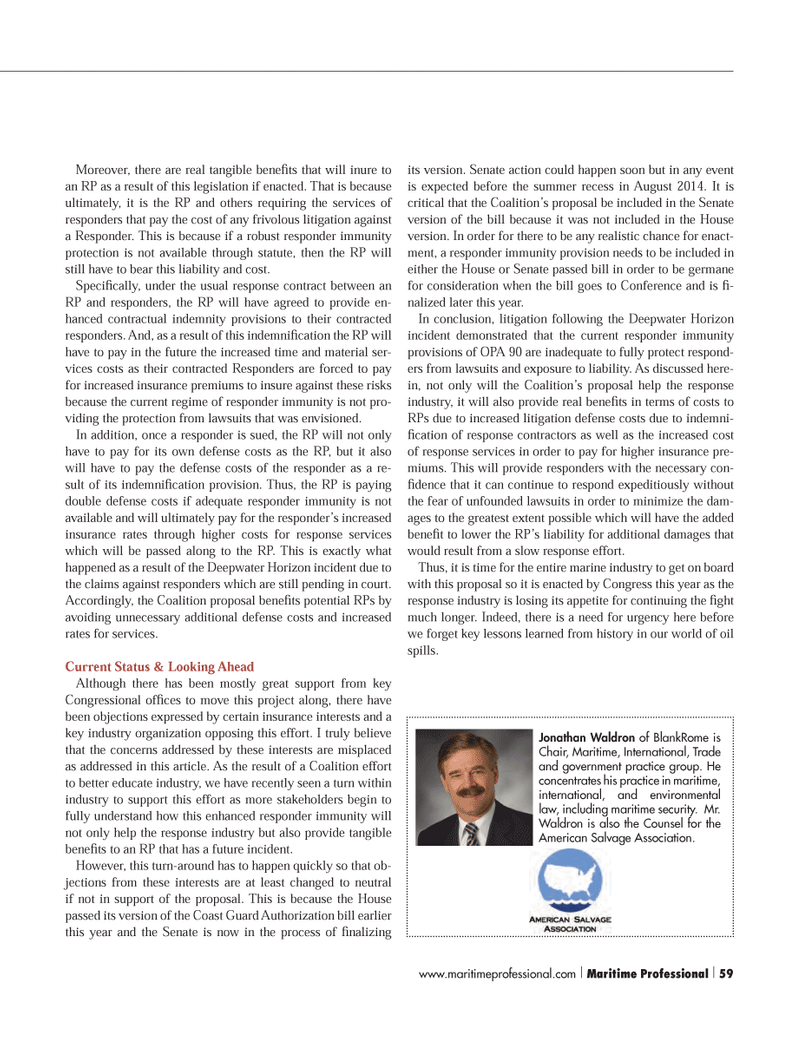
Page 59: of Maritime Logistics Professional Magazine (Q2 2014)
Maritime Risk & Shipping Finance
Read this page in Pdf, Flash or Html5 edition of Q2 2014 Maritime Logistics Professional Magazine
Moreover, there are real tangible benefi ts that will inure to an RP as a result of this legislation if enacted. That is because ultimately, it is the RP and others requiring the services of responders that pay the cost of any frivolous litigation against a Responder. This is because if a robust responder immunity protection is not available through statute, then the RP will still have to bear this liability and cost.
Specifi cally, under the usual response contract between an
RP and responders, the RP will have agreed to provide en- hanced contractual indemnity provisions to their contracted responders. And, as a result of this indemnifi cation the RP will have to pay in the future the increased time and material ser- vices costs as their contracted Responders are forced to pay for increased insurance premiums to insure against these risks because the current regime of responder immunity is not pro- viding the protection from lawsuits that was envisioned.
In addition, once a responder is sued, the RP will not only have to pay for its own defense costs as the RP, but it also will have to pay the defense costs of the responder as a re- sult of its indemnifi cation provision. Thus, the RP is paying double defense costs if adequate responder immunity is not available and will ultimately pay for the responder’s increased insurance rates through higher costs for response services which will be passed along to the RP. This is exactly what happened as a result of the Deepwater Horizon incident due to the claims against responders which are still pending in court.
Accordingly, the Coalition proposal benefi ts potential RPs by avoiding unnecessary additional defense costs and increased rates for services.
Current Status & Looking Ahead
Although there has been mostly great support from key
Congressional offi ces to move this project along, there have been objections expressed by certain insurance interests and a key industry organization opposing this effort. I truly believe that the concerns addressed by these interests are misplaced as addressed in this article. As the result of a Coalition effort to better educate industry, we have recently seen a turn within industry to support this effort as more stakeholders begin to fully understand how this enhanced responder immunity will not only help the response industry but also provide tangible benefi ts to an RP that has a future incident.
However, this turn-around has to happen quickly so that ob- jections from these interests are at least changed to neutral if not in support of the proposal. This is because the House passed its version of the Coast Guard Authorization bill earlier this year and the Senate is now in the process of fi nalizing its version. Senate action could happen soon but in any event is expected before the summer recess in August 2014. It is critical that the Coalition’s proposal be included in the Senate version of the bill because it was not included in the House version. In order for there to be any realistic chance for enact- ment, a responder immunity provision needs to be included in either the House or Senate passed bill in order to be germane for consideration when the bill goes to Conference and is fi - nalized later this year.
In conclusion, litigation following the Deepwater Horizon incident demonstrated that the current responder immunity provisions of OPA 90 are inadequate to fully protect respond- ers from lawsuits and exposure to liability. As discussed here- in, not only will the Coalition’s proposal help the response industry, it will also provide real benefi ts in terms of costs to
RPs due to increased litigation defense costs due to indemni- fi cation of response contractors as well as the increased cost of response services in order to pay for higher insurance pre- miums. This will provide responders with the necessary con- fi dence that it can continue to respond expeditiously without the fear of unfounded lawsuits in order to minimize the dam- ages to the greatest extent possible which will have the added benefi t to lower the RP’s liability for additional damages that would result from a slow response effort.
Thus, it is time for the entire marine industry to get on board with this proposal so it is enacted by Congress this year as the response industry is losing its appetite for continuing the fi ght much longer. Indeed, there is a need for urgency here before we forget key lessons learned from history in our world of oil spills.
Jonathan Waldron of BlankRome is
Chair, Maritime, International, Trade and government practice group. He concentrates his practice in maritime, international, and environmental law, including maritime security. Mr.
Waldron is also the Counsel for the
American Salvage Association. www.maritimeprofessional.com | Maritime Professional | 59 50-63 Q2 MP2014.indd 59 5/16/2014 3:02:04 PM

 58
58

 60
60
